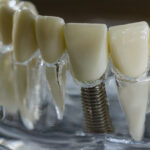Dental implant infections occur when harmful bacteria colonize the tissues around the implant, leading to swelling and potentially further complications. Although rare, it’s important to recognize the warning signs and symptoms early to prevent additional oral health issues.
Signs of Dental Implant Infection
- Swelling around the implant: One of the primary indicators of a dental implant infection is swelling around the implant site. If you notice persistent or excessive swelling, it is crucial to seek professional attention.
- Changes in gum color: Healthy gums should have a pinkish hue. However, if you observe a change in the color of your gums, such as redness or darkening, it could be a sign of an infection.
- Bleeding from the implant site: Unexplained bleeding or sensitivity around the implant area is a cause for concern. It may be an indication that an infection is present.
- Looseness of the implant: A stable dental implant should not move or feel loose. If you experience any movement or looseness, it could be a sign of an underlying infection that has affected the implant’s stability.
- Fever: In some cases, a dental implant infection may lead to the development of a fever. If you notice an unexplained rise in body temperature, it is important to consult a dental professional promptly.
- Throbbing pain and discomfort: Dental implant infections can cause persistent pain that does not subside even with medication. If you experience throbbing pain around the implant site, it is essential to seek immediate attention.
Diagnosis and Treatment
If you suspect a dental implant infection, it is crucial to schedule an appointment with a qualified dental professional at Madison Dentistry & Implant Center. They will conduct a thorough examination, including X-rays, to assess the condition and determine the most appropriate treatment plan.
Treatment options may include
Mechanical cleaning: For early-stage infections, mechanical cleaning methods such as sub-mucosal debridement may be employed. This involves removing the contaminated material from around the implant using specialized tools and techniques.
Antibiotics: Depending on the severity of the infection, your dentist may prescribe localized or systemic antibiotics to combat the bacterial infection.
Surgical intervention: In more advanced cases, surgical procedures such as open-flap debridement may be necessary. This involves accessing the infected area by surgically opening the gum tissue to remove the infection and facilitate proper healing.
Preventing Dental Implant Infections
While dental implant infections can occur, there are steps you can take to minimize the risk:
Maintain excellent oral hygiene: Brushing your teeth at least twice a day, flossing regularly, and using an antimicrobial mouthwash can help reduce the buildup of harmful bacteria.
Follow aftercare instructions: After receiving dental implants, it is crucial to follow your dentist’s aftercare instructions meticulously. This may include avoiding certain foods, practicing gentle oral care, and attending regular check-ups.
Quit smoking: Smoking can significantly increase the risk of dental implant infections. If you smoke, consider quitting or reducing your tobacco use to promote better oral health.
Make an Appointment Right Now!
Avoid waiting until the last minute. Make an appointment with one of Madison Dentistry & Implant Center skilled dentists today to take control of your dental health. Our staff will examine you, give you individualized treatment, and assist you in extending the life of your dental implants. Invest in your smile to reap the benefits of a healthier, more self-assured you. Reach out to us right now!




